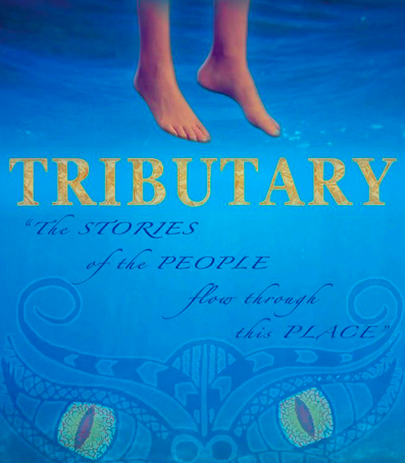Rosie Cann
The stylized set, by Kasey Collins and her mentor Nick Zwart, is the perfect backdrop to this narrative; sharp but soft, jagged but comforting. Similarly outstanding is the sound design by Josh McGowan, operated by Elly Love. The sounds of the river, the wind, and music blend and sweep to carry us through countless places, but it is a smooth and supportive journey. At times the sounds are eery, guttural, sinister, all the better to wrap us up in the stakes of each piece. The live vocal and instrumental music was outstanding in this piece, with incredible harmonies and even live looping from Madelaine Empsom.
The audience is cast throughout the piece as Bellbirds, friends, mates, and this does a wonderful job of keeping us present and in the room with the cast. The piece was full of joy in these moments and in others, such as with the children on the bus, the bizarre bourgeois farmers wives, and the ineffective doctor.
The physicality of the piece and the dance routines are both enjoyable and well choreographed, although it is obvious that the cast need slightly more rehearsal and confidence to fully commit to these highly physical sections, as the outstanding commitment visible in their emotive segments is not present here, and needs polishing. In the same manner, often the geography of spaces was not held, so the work that goes into creating a magical environment such as the dangerous swamp or the train station, is then broken by people walking across dangerous sections without injury. This is something to consider for re-staging this piece in the future; respect the worlds you create for us, or the magic breaks a little.
The piece also touched on some incredibly poignant issues. Most striking to me was Georgia Latief’s monologue on perfection, and being trapped in a harmful relationship but needing it to define you. Being never quite enough and too much. I cried. Hard. It is an all too familiar narrative and I absolutely congratulate Georgia on her vulnerability. Also incredible from the same performer was a very artful and elegant pole routine. Several of the men in the audience glance at their partners… 'oh what's all this about then?' And we see the male gaze embodied in our young male actors, peering down crudely as Georgia does a beautiful, soulful routine. This raises important conversation points around how we view pole, exotic dance forms in general, and how the male gaze can disempower sexually or sensually confident women and others.
The mislead of the Gluten section of the piece was interesting, and effective. Who are we to trivialize something that affect people's everyday lives? This challenge was welcome and exciting, however the setup of it being something more sinister - in my mind sexual abuse - meant that as an audience member I felt betrayed. By having a false lead up to something so sinister and then to sweep away from it feels somehow wrong, disrespectful; this is something to consider in future productions, as it was very effective but also upsetting.
Other parts of the performance that stick in my mind are those led by Laulauga Toia around being a Samoan cousin visiting Wellington and around being brown. Both were poginant, challenging, and the personal engagement was high in both. The cousin piece did something many of the pieces did: Portrayed a specific cultural perspective on a theme that transcends specificity. We have all been embarrassed by a relative. This piece had one line regarding a diet that made me prickle a little, as the heavy person was the butt of the joke about dieting, but other than that I found both pieces centred around Samoan identity in New Zealand really incredible. The inclusion of Samoan dance was elegant and well-polished.
Sasha Tilly must be congratulated for her rap, and did a great job in comically but heart-fully bringing attention to the ways we fat-shame, the ‘crimes’ we pin on fat women and the ways we judge each other. She is a strong performer with a strong point here, and we are with her. Pissing on stage, as a woman, will always be a beautiful thing to behold as well, isn’t it bewildering that letting your body be naturally how it is and do what it naturally does is a political statement in our culture?
These positive things being said, I would’ve liked to hear some more of the men’s stories of how they’re affected by the same oppressive structures as the women. We saw the men mostly playing caricatures of characters, which, while charming and funny, did not do enough to let us engage with their vulnerability so much. The gender split of grouping men and women separately was also apparent through most of the show, which, given the strength of the thematic material, I would also challenge in the case of a revival.
Overall, this was an important show, a jolly show, and a show that had me crying, singing along, wanting to dance with - and revel in the talents of - a wonderful cast. The narratives were mostly resolved, the shaping of the story was artful, and moments will resonate with me beyond this season. Well done to everyone involved, I hope to see this work restaged and developed even further. Aside from the strength of the cast in general, special mentions must also go to Belle Kinge for her crafted routine and exquisite form, Sinead Mahood for her monologue, Thomas Hart for his energy, Bethany Miller as Madame Gladys, Courtney Rose Brown as the horrifyingly beautiful drowning woman and Josh McGowan as Mate Hunter.
Keep up the good work, and keep fighting the good fight.






